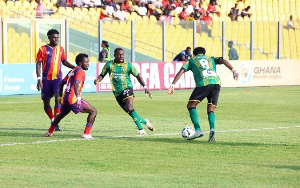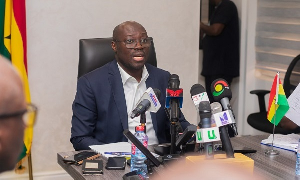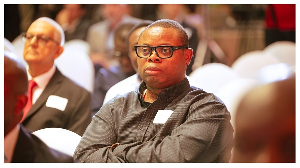You may be forgiven to fear for the worst: that the New Patriotic Party is quite efficiently over-pricing itself out of government. Who cares if Ghana is doing far better than several countries in the face of the current food crisis? Why should the trader on the tro-tro care if crude oil prices are five times more than what they were in 2000.
Crude oil ended the year 2000 at $20.95 a barrel. This week, it could hit $130 p/bbl and could well hit $200 before the year ends. Fortunately for Ghana, we have been able to stem the steep depreciation of the cedi to the dollar. For instance, the local currency saw its value to the dollar halved from ¢3,500 in January 2000 to ¢7,000 by December 2000. If this NDC trend had continued by even 10%, we would have today required ¢90,000 (GH¢9, instead of GH¢0.97) to buy a dollar!
This would have invariably meant exchanging a multiple of GH¢9 to the dollar to purchase crude oil in excess of $120. Though, the NDC is quick to urge government to reduce or remove specific tax elements on fuel, to ease the burden on the Ghanaian, they are only able to promise "to review" the taxes!
Take a ride in any tro-tro and NPP bashing appears to have replaced the voice of the vendors who sell one-cures-all herbal medicine. Prices are rising, everybody feels it; NPP gets all the blame. This is understandable because NPP is in power. Never mind the fact that, according to the Consumer Price Index, in 1981 the fare for the minimum tro-tro ride was ¢3.46, rising to ¢45 in 1992 and ¢775 by 2000.
Fellow Ghanaians, that represents corresponding increases of 1,200% (1981-92), 1,622.2% (1992-2000) and 22,298.8% for the entire P/NDC period. Today, the shortest tro-tro ride will set you back ¢3,000. That translates into 287.1% in the last 8 years! Though everybody agrees that increases in wages and salaries are now usually above inflation, this will not stop opposition propagandists, who have very little else to offer, from saying that life has deteriorated under the NPP.
So does the NPP continue struggling to get the message through this thick fog of persuasive opposition propaganda that feeds on the frailty of the human memory, or beat the propagandists to their game? It would be a real tragedy if the propaganda leads to a return of the NDC. Now that is what seems to be happening now.
Rawlings and his team tried to avoid it by subsidising fuel prices at the risk of collapsing the economy. But, their time was up. Ghanaians would not forgive the NPP if they don't act swiftly, boldly and responsibly to deny the opposition the oxygen of propaganda that is firing this growing discontent.
In the last year or so, Tullow Oil has since its share value on the London Stock Exchange grown by 527%. Need you ask why? The world believes that Ghana is now an oil-rich economy. In fact, with the latest announcement, Ghana is expected to be at least the third richest oil producer in Africa.
Experts now put Ghana's oil deposit anything between the 6 billion barrels and 250 billion barrels! By 2010, revenue from the oil must begin to flow. The first five years could generate anything like $15bn. If it means finding this year some sizeable money to cushion the current price hikes then let us not delay.
Qanawu is absolutely convinced that President Kufuor will do what he'?s good at: take his time, weigh all his options and do what is best for Ghana. What is best for Ghana certainly is to maintain the NPP in office. It is not for nothing that 35 years to the very day that it was reported in the Graphic that sector Minister R. R. Amponsah announced to the parliamentary press corps that Ghana had struck oil, Kofi Adda, as Energy Minister, also announced to Parliament that Ghana has struck oil, again in the same Western Region.
Oil, once discovered just doesn?t vanish. But, God must love Ghana. God, in his infinite wisdom must know that Ghana should be run by the Danquah-Busia family for it to realise the dreams of freedom, prosperity, peace and security for which the founding fathers died. So, He hid it from all the dictators, and bad governments that followed the Progress Party?s overthrow until 2007, after President Kufuor had brought stability and sanity back into the system.
There is no reason against the NPP injecting some subsidy to cushion the concerns. We have no choice! The truth is, the current petroleum levies structure was introduced by the NDC in the national budget read on February 17, 1998.
In realigning petroleum taxes, the NDC restructured "the Excise Duty on petroleum products so as to include a component which will be ad-valorem to the ex-refinery price." A year before that, the NDC had reached an agreement with the Breton Wood institutions to deregulate petroleum and utility pricing. One IMF condition was for the ¢80 petroleum excise duty to become effective by June 1, 2000 at the latest.
In 1997, the yearly average price of crude oil p/bbl was $18.97. By 1998, it had fallen heavily to $11.91. This gave the NDC a lot of breathing space, with prices moving up to a yearly average of $16.55 in 1999.
But, things just got worse in election year 2000, with the yearly total average going up to $27.40. But, the NDC, after raising prices in April, when the price per barrel was around $21.93, shifted into heavy subsidisation of petroleum products, even when in September 2000, the price of crude breached the 30 dollar mark, President Rawlings could only call for the country to start paying "realistic prices" for fuel but he dared not implement it.
The P/NDC, however, has not always been this soft on fiscal discipline. The challenges and dynamics of competitive politics forced the NDC to lose all the macro-economic gains made in the 1980s, when the Ghanaian worker was forced to tighten his belt for the structural adjustment programme to succeed.
Under military regimes you could get away with murder, if only you could prevent the other guy in green from picking up a gun against you. With events in Iran and Iraq leading to another round of crude oil crisis in 1979-1980, Rawlings used the economic crunch that the PNP faced to overthrow it. By 1982, the yearly average of crude oil was $31.55, falling marginally to $29 the following year.
The PNDC responded by announcing that with effect from Republic Day, 1982, no vehicle will be registered as a commercial vehicle unless it has a diesel engine! Petrol ration coupons were rigidly enforced. The next budget increased the ex-pump price by almost 95%. The explanation was that prices in Ghana were substantially lower than in Cote d?Ivoire and Togo.
The government said the ¢1.4bn subsidy on oil was "intolerable." In the 1984 budget, read on April 18, subsidy on petroleum was withdrawn, with a promise to allow prices to effectively reflect the external charges in the price of petroleum products.
The ordinary Ghanaian felt the pinch, but the PNDC knew if it was to fix the economy then it had very little option left. Thankfully there were no general elections to worry about. Prices went up again, with the excuse that lower prices were encouraging smuggling of petroleum products to neighbouring countries.
By 1990, petrol prices went up again, on January 20, 1990, the Finance Minister announced that the PNDC was determined to "pursue actions that will ensure the availability of petroleum products on the local market but at prices that cover the full cost of importation, refining and marketing."
So, by the time the PNDC metamorphosed into the NDC, the price of premium had increased by 12,891%, from ¢12.30 in 1982 to ¢1,598 in 1993. Diesel suffered a similar fate from ¢8.50 to ¢1,359 (15,888%) for the same period.
The truth is that crude oil prices became cheaper under the NDC than the PNDC, even nominally, so it was not strange that for the NDC period the increase was a relatively lowly 430% for even kerosene.
When John Dramani Mahama said this election was not about comparing records because that would be "a recipe for mediocrity," Qanawu understood Prof Mill?s running mate fully. The records simply don?t favour the National Democratic Congress. A critical look at them only suggests that rather a vote for the John & John duo would only be a recipe for mediocrity.
The MP for Bole Bamboi, after making that point, added that the 20-year P/NDC record "was impressive." Certainly, if you compare it to the collective achievements of the NRC/SMSI/SMCII/PNP governments, the Rawlings era made some necessary strides. But, this year?s election is really a straight fight between the NPP and NDC. If in doubt ask Freddie Blay, who has done what Nduom joined him in 2004 to do, which is to ignore the CPP candidate to support the NPP candidate for President.
John Mahama was generous enough to cite but one own-goal example why the NPP cannot match the NDC on the achievements scale. He said, for the 40 years between 1960 and 2000, the Ghana Government contracted external loans totalling $10 billion. And, that from 2001 to 2007, the NPP has signed external loans to the tune of $4.7 [sic] billion (the actual number is $4.36bn). But, what John failed to tell Ghanaians is that 81% of the $10bn ($8.1bn) went to the P/NDC, with over half of those resources accruing to the NDC (from 1993-200).
"To whom much is given, much is expected," the good Christian, Mr Mahama told his jubilant audience. But, with the NPP administration spending more on roads, rural electrification, water, health, education, and policing, one could say that from whom much has been received more time in office is expected.















